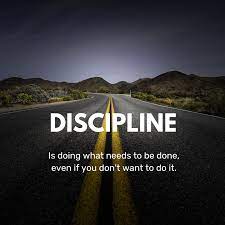Why Discipline Beats Motivation
In the pursuit of personal and professional goals, two forces often come into play: motivation and discipline. While motivation is frequently celebrated as the spark that ignites action, it’s discipline that ensures sustained progress. This article explores why discipline consistently outperforms motivation in achieving long-term success, delving into their differences, the limitations of motivation, the power of discipline, and practical ways to cultivate it.
The Nature of Motivation
Motivation is an emotional state, a burst of energy that propels you toward your goals. It’s the excitement you feel after watching an inspiring TED Talk, reading a self-help book, or setting a New Year’s resolution. Motivation is powerful—it can kickstart action and make you feel invincible. However, it’s also fleeting. Like a sugar rush, motivation spikes quickly but often fades just as fast.
Consider the scenario of starting a fitness journey. You watch a video of an athlete’s transformation, and suddenly you’re eager to hit the gym. You sign up for a membership, buy new workout gear, and dive in with enthusiasm. But a few weeks later, when the initial excitement wanes, you’re left struggling to get out of bed for that 6 a.m. workout. This is the crux of motivation’s limitation: it’s unreliable and heavily influenced by external factors.
Motivation depends on mood, environment, and inspiration. If you’re tired, stressed, or simply not “feeling it,” motivation can vanish. Studies in behavioral psychology suggest that motivation is tied to dopamine, a neurotransmitter associated with pleasure and reward. When the novelty of a goal wears off, dopamine levels drop, and so does your drive. This makes motivation a shaky foundation for long-term success.
The Power of Discipline
Discipline, on the other hand, is the ability to act consistently regardless of how you feel. It’s showing up to the gym even when you’re tired, writing a page of your novel when you’d rather scroll through social media, or studying for an exam when Netflix is calling. Discipline is about building habits and systems that keep you moving forward, even when motivation is nowhere to be found.
Unlike motivation, which is emotional, discipline is behavioral. It’s rooted in commitment and routine, not fleeting feelings. Discipline doesn’t care if you’re inspired or not—it’s about doing the work. This makes it a far more reliable driver of success. For example, a 2013 study published in the Journal of Personality found that self-discipline was a stronger predictor of academic success than IQ. Students who consistently studied, regardless of their mood, outperformed those who relied on bursts of motivation.
Discipline also compounds over time. Small, consistent actions build momentum, creating a snowball effect. Writing 500 words a day may seem insignificant, but over a year, that’s 182,500 words—enough for a novel. This is the essence of discipline: incremental progress that leads to monumental results.
Why Motivation Falls Short
Motivation’s biggest flaw is its inconsistency. It’s like a fair-weather friend—great when things are going well, but absent when you need it most. Here are some reasons why relying solely on motivation is problematic:
- It’s External-Dependent: Motivation often stems from external sources like inspirational quotes, success stories, or rewards. When those sources dry up, so does your drive.
- It’s Temporary: Motivation is a short-term boost. Once the initial excitement fades, you’re left with nothing to sustain your efforts.
- It’s Mood-Driven: If you’re not in the right headspace, motivation disappears. Stress, fatigue, or a bad day can derail your plans.
- It’s Overhyped: Society glorifies motivation, with phrases like “stay motivated” plastered across social media. This creates an unrealistic expectation that you should always feel excited, which is impossible.
Take the example of entrepreneurship. Starting a business is thrilling, and motivation might carry you through the planning phase. But when you’re faced with tedious tasks like bookkeeping or customer complaints, motivation alone won’t cut it. Discipline, however, ensures you tackle those tasks consistently, keeping your business afloat.
The Strengths of Discipline
Discipline’s reliability makes it a superior force for achieving goals. Here’s why:
- It’s Internal: Discipline comes from within. It’s a choice to act, not a reaction to external stimuli. This makes it more resilient to life’s ups and downs.
- It Builds Habits: Discipline creates routines that become second nature. Once a habit is formed, it requires less mental effort to maintain. According to Charles Duhigg, author of The Power of Habit, habits account for 40% of our daily actions.
- It’s Sustainable: Unlike motivation, discipline doesn’t rely on feeling good. It thrives on commitment, making it a long-term strategy for success.
- It Fosters Resilience: Discipline teaches you to push through discomfort, building mental toughness. This resilience is critical for overcoming obstacles.
Consider professional athletes. They don’t train only when they feel motivated. They follow strict schedules, showing up day after day, even when exhausted. This discipline is what separates champions from dreamers.
How to Cultivate Discipline
Discipline isn’t something you’re born with—it’s a skill you can develop. Here are practical strategies to build discipline and reduce reliance on motivation:
1. Start Small
Big changes are overwhelming, so begin with manageable actions. If you want to read more, start with 10 pages a day instead of aiming for a book a week. Small wins build confidence and momentum. James Clear, author of Atomic Habits, emphasizes the power of 1% improvements—tiny changes that compound over time.
2. Create Systems and Routines
Systems eliminate the need for willpower. Set specific times for tasks, like writing every morning at 7 a.m. Use tools like calendars, to-do lists, or habit-tracking apps to stay organized. A 2017 study in Psychological Science found that people who used planning tools were more likely to stick to their goals.
3. Remove Temptations
Your environment shapes your behavior. If you want to eat healthier, clear your kitchen of junk food. If you want to focus, turn off notifications. By reducing distractions, you make disciplined choices easier.
4. Embrace Discomfort
Discipline often means doing things you don’t want to do. Accept that discomfort is part of growth. When you feel like skipping a workout, remind yourself that showing up is a victory in itself.
5. Focus on Identity
Instead of focusing on what you want to achieve, focus on who you want to become. If you want to be a writer, adopt the identity of someone who writes daily. This shift in mindset makes discipline feel like a natural extension of who you are.
6. Track Your Progress
Monitoring your efforts reinforces discipline. Use a journal or app to track your habits, like how many days you’ve meditated or exercised. Seeing your streak grow can be a powerful motivator in itself.
7. Forgive Slip-Ups
Nobody is perfect. If you miss a day, don’t abandon your goal. Research from the Journal of Consumer Psychology shows that self-compassion after setbacks increases the likelihood of getting back on track.
Discipline in Action: Real-Life Examples
History is full of examples of discipline triumphing over motivation. Take J.K. Rowling, who wrote Harry Potter while working as a single mother. She didn’t rely on bursts of inspiration—she committed to writing daily, even in tough circumstances. Her discipline led to one of the most successful book series of all time.
Similarly, consider Elon Musk. His work ethic is legendary, with stories of 100-hour workweeks. While he’s undoubtedly driven, it’s his disciplined approach—consistently tackling complex problems—that has built companies like Tesla and SpaceX.
Even in everyday life, discipline shines. A student who studies a little every day will likely outperform one who crams before exams. A freelancer who works consistently, even on uninspiring tasks, will build a stronger portfolio than one who waits for creative sparks.
Balancing Discipline and Motivation
While discipline is superior, motivation isn’t useless. It can serve as a catalyst to get started. The key is to use motivation to spark action, then rely on discipline to sustain it. For example, use an inspiring podcast to kickstart a project, but build a schedule to keep it going.
Think of motivation as the match and discipline as the fuel. The match starts the fire, but without fuel, it burns out quickly. By building disciplined habits, you create a steady source of fuel that keeps your progress burning strong.
Conclusion
In the battle between discipline and motivation, discipline emerges as the clear winner. While motivation provides the initial push, it’s discipline that carries you across the finish line. By building systems, embracing discomfort, and focusing on small, consistent actions, you can achieve your goals without relying on fleeting bursts of inspiration. Discipline is the backbone of success—it’s not glamorous, but it’s effective. So, the next time you’re waiting for motivation to strike, remember: just show up, do the work, and let discipline lead the way.






